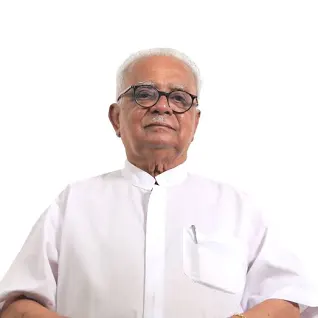By P.K.Balachandran
Colombo, April 18: If there was anyone in Sri Lanka who encapsulated the fullness of the spirit of Mahatma Gandhi, it was Dr.A.T.Ariyarane, founder of the Sarvodaya Movement, who died at the age of 92 on Tuesday.
It was therefore not a surprise that the renowned Sri Lankan-American writer, educator and administrator, Dr. Patrick Mendis, described Dr. Ariyaratne as “Sri Lanka’s Gandhi.”
Dr.Ariyaratne was an embodiment of the civilizational, spiritual, cultural and social consciousness that has bound Sri India and India since ancient times. The Sarvodaya movement, which Dr. Ariyaratne founded in 1958 and led for decades, drew its inspiration from the philosophy and work of Mahatma Gandhi and his disciple, Acharya Vinoba Bhave.
If Gandhi and Vinoba took the Indian independence movement to the many villages of India and made it relevant to their felt needs and aspirations, Dr. Ariyaratne took his Sarvodaya movement to the villages and marginalized communities of Sri Lanka, addressing their issues and helping them overcome their travails. And he did that without seeking any return in the true Gandhian spirit.
In a speech delivered at the Sarvodaya Trust Fund on June 18, 2006, the then Indian High Commissioner in Sri Lanka, Nirupama Rao, commended the aptness of the term “Sarvodaya” for Dr.Ariyaratne’s movement.
“Sarvodaya”, she said, meant “awakening of all.” Awakening has been the goal of philosophers since the dawn of history. Awakening has included awakening from ignorance. It meant sensitivity to the sufferings of fellow men and women.
Mahatma Gandhi once said that if there is to be awakening in society, it has come first to the person who wants to be an agent of change. One has to be the change one wants to see in others he said. Verily, Dr.Ariyaratne’s life and his work embodied the change he wanted to see in society, as it was in the case of Gandhi and Vinoba. And the Sarvodaya movement, with its multifarious activities, embodied the concept of awakening in the fullness of term.
“Since 1969, when he won the Magsaysay Award, Dr. Ariyaratne’s has been a household name in Asia, and his receiving the Gandhi Peace Prize and the Jamnalal Bajaj Award was a reflection of the high esteem and regard with which he is held in all of India.” Rao said.
“In Dr. Ariyaratne, we have a man, who like it was said of Mahatma Gandhi, is able to voice the sentiments of his country’s culture and ethos as probably no one else can do,” the High Commissioner said.
She pointed out that Dr.Ariyaratne was “the soul of simplicity, claiming no exclusive validity for his creed or religion, because we know that all religions aim at the same goal of the inner life, the inner truth.” Dr. Ariyaratne and Sarvodaya represented the age-old tradition in both Sri Lanka and India, a tradition of respecting diversity.
Further, having inculcated in his inner self and his work the ideals of Mahatma Gandhi and Vinoba Bhave, Dr. Ariyaratne, saw politics as a branch of ethics and religion, not as a struggle for power and wealth, but a continuous effort to raise the quality of human beings. The task of politics was “to train people for freedom and fellowship, spiritual depth and harmony.”
In his work, Rao said, Dr. Ariyaratne had always striven for reconciliation, and the removal of suspicion, bitterness and resentment. He did not want Sri Lankans to think in water-tight compartments as Buddhists, Hindus, Christians or Muslims but as one people.
“It was Jawaharlal Nehru who remarked that the voice and message of Mahatma Gandhi sounded so often to us as a reiteration of the Buddha’s. I know that the ideals of Lord Buddha have guided the work of Sarvodaya, too. The message and teachings of the Buddha, enable us to look at our problems in the right perspective, draw back from conflict, violence and hatred,” Rao said.
Sarvodaya, the Indian envoy pointed out, provided a strong anchor for those who were dejected and dispirited, and gave them the spiritual sustenance that enabled them to face life with a smile and with hope
Mahatma Gandhi laid stress on the manner of doing things, on the means employed. It was not enough, he used to say, to have a right objective, to have right ends in view, but also to adopt the right method and right means, and that ideal guided the work of Sarvodaya, Rao pointed out.
“The true test of leadership is to draw out the best in those who work with you. I know that through Sarvodaya, thousands of people have been inspired to give of their best to society, and to their fellow Sri Lankans,” the Indian High Commissioner said.
“The linkages between Sarvodaya and India are manifold and I need not elaborate on them. Suffice it to say that our two countries must share a precious and everlasting harmonious understanding cemented by the ideals of great visionaries like Lord Buddha, Emperor Ashoka, and Mahatma Gandhi.”
“Sarvodaya is very much a part of the tradition inculcated in us by those great visionaries. Let us therefore celebrate the work and the mission of Sarvodaya – the true awakening of all,” Rao said.
END





